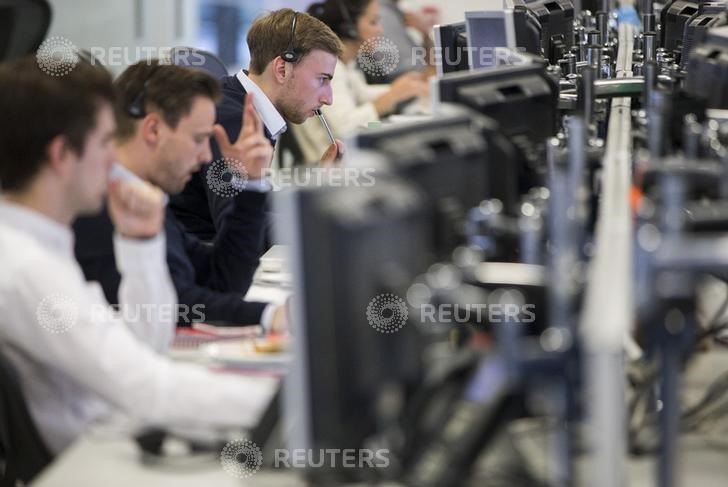Bitcoin price today: slips below $113k, near 6-wk low despite Fed cut bets
(Removes extraneous words in paragraph 11; fixes price change
in gold in paragraph 18)
* China's yuan on track for biggest monthly decline since
1994
* Wall St stocks lower; German real estate lifts European
shares
* Euro falls on expectations of aggressive ECB easing
By April Joyner
NEW YORK, Aug 30 (Reuters) - Hopes of easing trade tensions
between China and the United States helped a gauge of global
stocks edge higher on Friday despite weakness on Wall Street,
though caution over pending U.S. tariffs on Chinese goods put
the yuan on track for its biggest monthly decline in 25 years.
Statements from U.S. President Donald Trump and China's
commerce ministry on Thursday that the countries were engaged in
trade talks brought some respite to equities, which have been
roiled this month by escalating trade tensions, including the
announcement of further tit-for-tat tariffs. The pan-European STOXX 600 .STOXX rose 0.7%, helped by a
surge in German real estate shares, though U.S. stocks gave up
early gains. The MSCI All-Country World Index .MIWD00000PUS
rose 0.23%.
On Wall Street, the Dow Jones Industrial Average .DJI rose
12.01 points, or 0.05%, to 26,374.26, the S&P 500 .SPX lost
1.44 points, or 0.05%, to 2,923.14 and the Nasdaq Composite
.IXIC dropped 30.32 points, or 0.38%, to 7,943.08.
Friday notwithstanding, MSCI's gauge of global stocks was on
track for its second monthly loss of the year and its biggest
August percentage decline since 2015.
Market watchers expressed caution given the fluctuating
rhetoric around U.S.-China trade relations. Despite recent
conciliatory comments, the Trump administration on Sunday is
scheduled to begin collecting 15% tariffs on more than $125
billion in Chinese imports, including smart speakers, Bluetooth
headphones and many types of footwear.
China's yuan CNH= fell 0.26% to 7.161 per dollar and was
on track for its weakest month since Beijing's currency reform
in 1994. "The U.S.-China situation is like a prisoner's dilemma,"
said Jeremy Gatto, senior vice president and portfolio manager
at Unigestion in Geneva. "The parties have more to gain by
cooperating, but they've almost gone too far back to find a
solution.
"We'll be living with trade war fears for a while to come,"
Gatto said.
In fixed-income markets, U.S. Treasury yields treaded water,
with the yield curve between 2-year and 10-year notes
US2US10=TWEB still inverted. An inversion of the yield curve
is widely seen as a signal that a recession is likely in one to
two years. Benchmark 10-year Treasury notes US10YT=RR last yielded
1.5163%, from 1.516% late on Thursday.
Euro zone bond yields were capped by data showing inflation
remained at 1.0% in August, well below the European Central
Bank's target. Italian bond yields were on track for their biggest monthly
decline in more than six years after the anti-establishment
5-Star Movement and opposition Democratic Party reached an
agreement on a coalition government. Among currencies, the euro EUR= tumbled 0.60% to $1.10
after the low euro zone inflation figure raised expectations for
aggressive easing by the ECB.
The dollar index .DXY rose 0.32%.
The safe-haven Japanese yen JPY= rose 0.21% to 106.28 per
dollar and was on track for its biggest monthly gain in three
months.
Sterling GBP= stabilized at $1.2164 ahead of a crucial
period for the British parliament before it is suspended ahead
of Britain's scheduled exit from the European Union on Oct. 31.
In commodities, spot gold XAU= was little changed at
$1,527.46 an ounce. U.S. crude CLc1 fell 3.05% to $54.98 per
barrel and Brent LCOc1 was last at $60.31, down 1.26% on the
day.
<^^^^^^^^^^^^^^^^^^^^^^^^^^^^^^^^^^^^^^^^^^^^^^^^^^^^^^^^^^^
stocks in Aug https://tmsnrt.rs/2ztDVlL
^^^^^^^^^^^^^^^^^^^^^^^^^^^^^^^^^^^^^^^^^^^^^^^^^^^^^^^^^^^>
